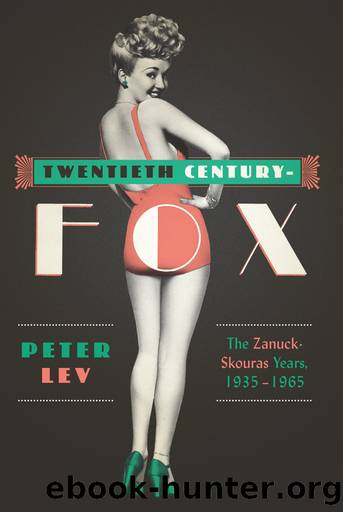Twentieth Century-Fox by Peter Lev

Author:Peter Lev [Lev, Peter]
Language: eng
Format: epub
Publisher: University of Texas Press
Published: 2013-01-15T00:00:00+00:00
CHAPTER 4
A Slow Decline, 1951â1960
Troubles
The early 1950s were an anxious time for Twentieth Century-Fox. The film-going audience in the United States dropped about 10 percent in 1951; in 1952 attendance started strong, but in the fall it suddenly dropped another 10â20 percent. The split between Foxâs production and exhibition businesses was also looming, which meant that the company would soon lose a major chunk of its assets and revenue. Business as usual was not an option, and so Spyros Skouras in New York and Darryl Zanuck in Los Angeles both announced economy moves. Skouras in 1951 said that 130 Fox executives would take two-year âvoluntaryâ pay cuts to keep the business on a sound financial basis. He then tried to extend these cuts to highly paid directors and actors, but he ran into difficulties because of guild agreements and the issue of whether talent on long-term contracts and talent hired by the picture should both be cut.1 Executive pay was reduced, but with the proviso that it could be restored by profit sharing. By the end of 1951 Skouras declared that business had improved and therefore he would return the executive salary deductions for that year.2 Meanwhile, Zanuck was gradually reducing the production budgets of Fox films, even though union salaries were rising. Zanuck aimed to limit costs by speeding up productions, reducing the number of Fox employees on long-term contracts, hiring less expensive talent when possible, and especially by moving productions out of Los Angeles.3 Projects shot on location could avoid some of the very expensive labor costs of studio-based films, with the largest savings coming from filming abroad. Films made in Europe or in other parts of the world had much lower costs, at least in theory; sometimes different rules and customs, expense padding by local suppliers, and unpredictable weather added huge sums to the original budget estimates. Many films produced abroad also had access to blocked funds that could not be saved or spent in the United States.
In mid-1951, Foxâs plan for the âdivorceâ between production and exhibition sides of the business was approved in court with a deadline of two years for implementation. Twentieth Century-Fox would become a film production and distribution company in the United States; it would sell all of its U.S. theaters but could keep the theaters it owned in other countries. The theater chain would become National Theaters Inc., an independent company. For a while it seemed that Fox would be allowed to keep the Roxy Theater, its New York showcase, but in the finished deal the Roxy became part of National Theaters.4 The split was finalized on 27 September 1952, well before the two-year deadline. Spyros Skouras remained the president of Twentieth Century-Fox, and his older brother Charles became president of National Theaters. Darryl Zanuck and Joseph Schenck remained with Fox, although Schenck was to leave the company in 1953. Both Twentieth Century-Fox and National Theaters were weakened by the split because of smaller income and greater uncertaintyâthe smooth supply of releases to theaters was gone.
Download
This site does not store any files on its server. We only index and link to content provided by other sites. Please contact the content providers to delete copyright contents if any and email us, we'll remove relevant links or contents immediately.
Pale Blue Dot by Carl Sagan(4981)
The Rules Do Not Apply by Ariel Levy(4930)
Goodbye Paradise(3788)
Ogilvy on Advertising by David Ogilvy(3578)
Liar's Poker by Michael Lewis(3429)
Delivering Happiness by Tony Hsieh(3407)
Into Thin Air by Jon Krakauer(3368)
Purple Cow by Seth Godin(3176)
Rogue Trader by Leeson Nick(3031)
The Social Psychology of Inequality by Unknown(3005)
The Airbnb Story by Leigh Gallagher(2833)
4 - Harry Potter and the Goblet of Fire by J.K. Rowling(2692)
The Mind Map Book by Tony Buzan(2558)
Bossypants by Tina Fey(2513)
Claridge's: The Cookbook by Nail Martyn & Erickson Meredith(2389)
All the President's Men by Carl Bernstein & Bob Woodward(2355)
Six Billion Shoppers by Porter Erisman(2287)
Master of the Game by Sidney Sheldon(2274)
Alibaba by Duncan Clark(2069)
